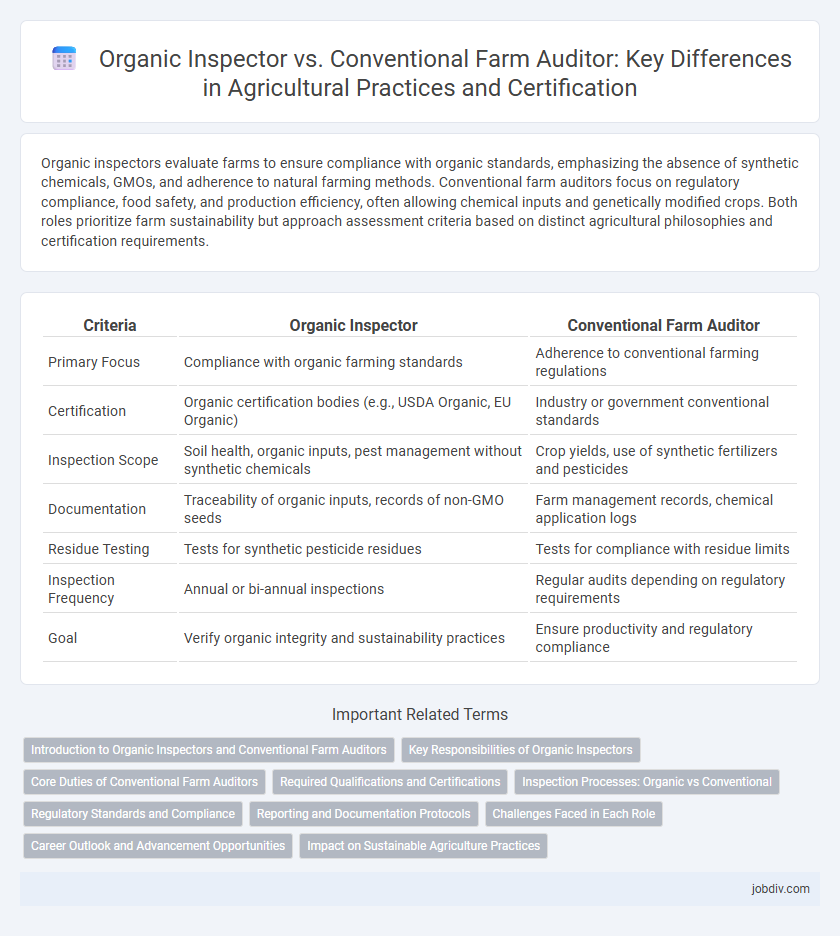Organic inspectors evaluate farms to ensure compliance with organic standards, emphasizing the absence of synthetic chemicals, GMOs, and adherence to natural farming methods. Conventional farm auditors focus on regulatory compliance, food safety, and production efficiency, often allowing chemical inputs and genetically modified crops. Both roles prioritize farm sustainability but approach assessment criteria based on distinct agricultural philosophies and certification requirements.
Table of Comparison
| Criteria | Organic Inspector | Conventional Farm Auditor |
|---|---|---|
| Primary Focus | Compliance with organic farming standards | Adherence to conventional farming regulations |
| Certification | Organic certification bodies (e.g., USDA Organic, EU Organic) | Industry or government conventional standards |
| Inspection Scope | Soil health, organic inputs, pest management without synthetic chemicals | Crop yields, use of synthetic fertilizers and pesticides |
| Documentation | Traceability of organic inputs, records of non-GMO seeds | Farm management records, chemical application logs |
| Residue Testing | Tests for synthetic pesticide residues | Tests for compliance with residue limits |
| Inspection Frequency | Annual or bi-annual inspections | Regular audits depending on regulatory requirements |
| Goal | Verify organic integrity and sustainability practices | Ensure productivity and regulatory compliance |
Introduction to Organic Inspectors and Conventional Farm Auditors
Organic inspectors specialize in evaluating farms to ensure compliance with organic certification standards, focusing on soil health, pest management, and the absence of synthetic chemicals. Conventional farm auditors assess agricultural operations based on regulatory requirements, safety protocols, and production efficiency, often emphasizing pesticide usage and conventional farming practices. Both roles are crucial in maintaining agricultural standards but differ significantly in their focus and criteria.
Key Responsibilities of Organic Inspectors
Organic Inspectors ensure compliance with national organic standards by thoroughly examining farms for organic certification, verifying the use of approved pesticides and fertilizers, and checking soil conservation practices. They conduct detailed record reviews and on-site inspections to confirm that farms avoid synthetic chemicals, GMOs, and non-organic inputs. Their role is critical in maintaining the integrity of organic labeling and supporting sustainable agricultural practices.
Core Duties of Conventional Farm Auditors
Conventional farm auditors primarily evaluate crop production practices to ensure compliance with industry standards, including pesticide use, soil management, and record-keeping accuracy. They inspect equipment calibration, chemical storage, and application procedures to verify adherence to safety and environmental regulations. Their core duties also involve verifying traceability systems and documenting non-compliance issues to support certification and market access.
Required Qualifications and Certifications
Organic Inspectors must possess comprehensive knowledge of organic standards such as USDA NOP or EU Organic Certification and hold relevant certifications like accredited organic inspection training credentials. Conventional Farm Auditors typically require expertise in general agricultural practices, compliance with GAP (Good Agricultural Practices), and certifications such as GlobalGAP or ISO standards. Both roles demand strong understanding of regulatory frameworks, but Organic Inspectors focus more on organic-specific qualifications while Conventional Auditors emphasize broader agricultural and safety certifications.
Inspection Processes: Organic vs Conventional
Organic inspectors conduct thorough evaluations based on USDA organic standards, verifying compliance with natural inputs, soil health, and prohibition of synthetic chemicals. Conventional farm auditors focus on regulatory adherence related to pesticide use, fertilizer applications, and overall farm management best practices. Inspection processes for organic farms emphasize detailed record-keeping, residue testing, and soil quality assessments, while conventional inspections prioritize safety protocols and production efficiency.
Regulatory Standards and Compliance
Organic inspectors rigorously evaluate farms against USDA National Organic Program standards, ensuring compliance with strict regulations on synthetic pesticide prohibition, crop rotation, and soil fertility management. Conventional farm auditors assess adherence to industry-specific safety protocols, environmental regulations, and quality standards but allow the use of chemical inputs and genetically modified organisms. Both roles require thorough documentation review and on-site inspections to verify regulatory compliance, with organic inspectors emphasizing certification requirements unique to organic agriculture.
Reporting and Documentation Protocols
Organic inspectors rigorously verify compliance with organic standards through detailed reporting and comprehensive documentation of inputs, soil conditions, and pest management practices. Conventional farm auditors focus on documenting adherence to regulatory guidelines and operational procedures, emphasizing chemical usage and yield data. Both roles require precise record-keeping but differ significantly in origin criteria, scope of documentation, and regulatory frameworks governing organic certification versus conventional farm operations.
Challenges Faced in Each Role
Organic inspectors face challenges in verifying compliance with complex organic certification standards, often dealing with variable natural inputs and the need for thorough documentation of organic practices. Conventional farm auditors encounter difficulties in assessing adherence to regulatory requirements related to pesticide use, fertilizer application, and environmental impact, where standardized protocols must be consistently applied across diverse farm operations. Both roles demand rigorous attention to detail and up-to-date knowledge of evolving agricultural regulations to ensure accurate and fair audits.
Career Outlook and Advancement Opportunities
Organic Inspectors experience growing demand driven by increased consumer preference for certified organic products, with career advancement opportunities in certification agencies and regulatory bodies. Conventional Farm Auditors maintain steady employment prospects, especially within large-scale agribusinesses and food safety organizations, offering pathways to senior compliance and quality assurance roles. Both careers require specialized knowledge of agricultural standards, but Organic Inspectors often benefit from expanding markets and evolving organic certification regulations.
Impact on Sustainable Agriculture Practices
Organic inspectors ensure compliance with organic standards by verifying practices like soil health management, biodiversity preservation, and restricted pesticide use, directly supporting sustainable agriculture. Conventional farm auditors focus on regulatory adherence and risk management, often emphasizing productivity and input optimization over ecological balance. The organic inspection process fosters long-term sustainability by promoting environmentally friendly practices and enhancing ecosystem resilience.
Organic Inspector vs Conventional Farm Auditor Infographic

 jobdiv.com
jobdiv.com